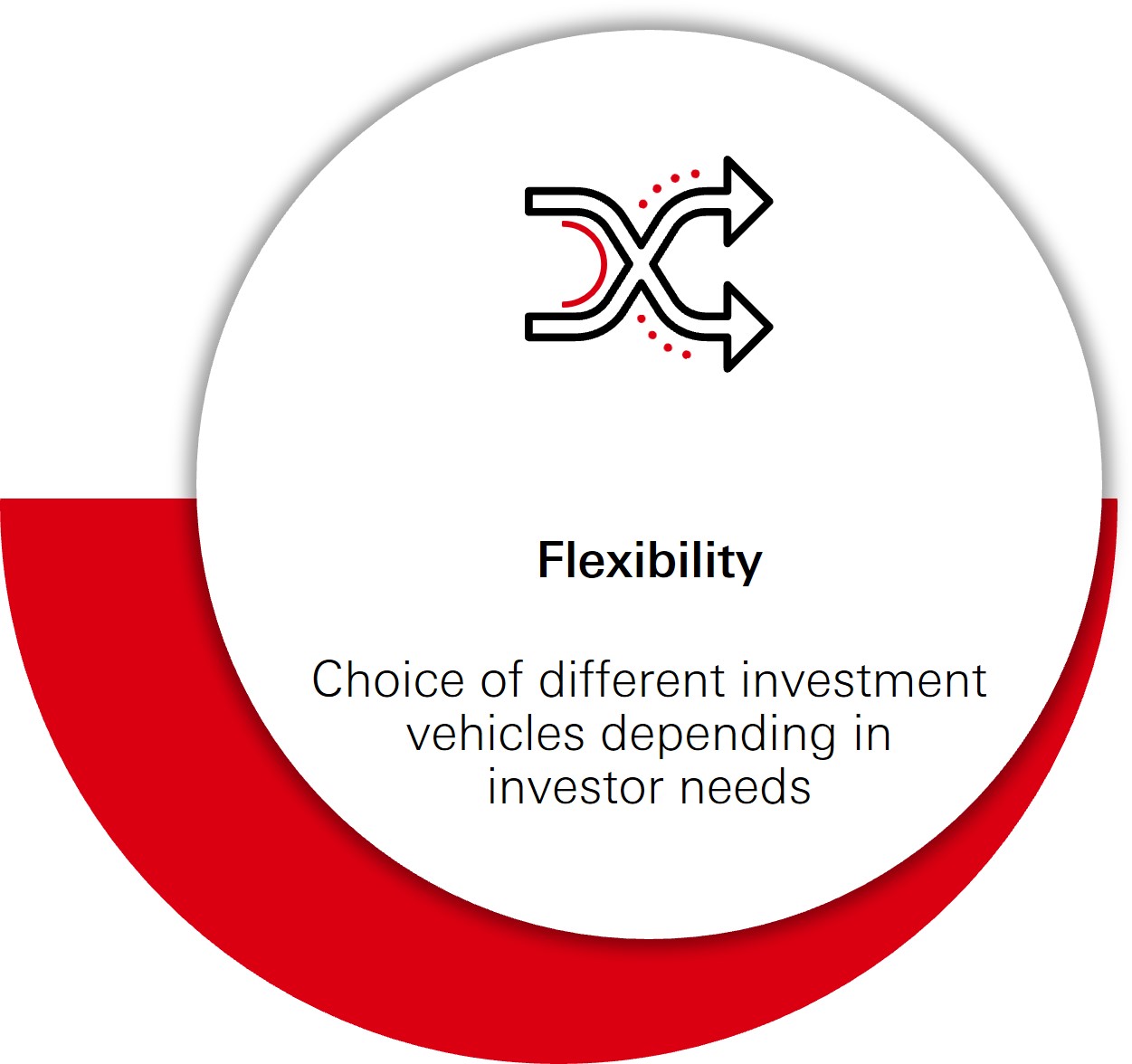ETF Share Classes
Dual listing arrangement
ETF Share Classes in 30 seconds
A range of ETF share classes are now available on a selection of our Fixed Income index funds. The combination of ETF and unlisted share classes allows investors that prefer ETF structures to access funds with well-established assets under management through a variety of unhedged and hedged exposures to accommodate requirements within their portfolio construction needs
Three distinct advantages
 |
 |
 |
What does this mean in practice
- The listed ETF share classes transact on the exchange (not through the ICAV) in exactly the same way as any standard ETF with no minimum subscription amount1
- The unlisted index mutual fund share classes can be bought or sold in exactly the same way as standard index mutual fund share classes (through the ICAV platform) where minimum subscription amounts may apply
- Listed and unlisted share classes are not fungible despite sharing the same pool of underlying assets and switches between the two are currently not available
Notes:
1. In the case of Non-ETF Shares, an investor must make an initial subscription to the ICAV in an amount equal to or greater than the minimum initial subscription amount (if any) specified in the ICAV’s legal documentation
Key risks
The value of an investment in the portfolios and any income from them can go down as well as up and as with any investment you may not receive back the amount originally invested.
- Concentration Risk: The Fund may be concentrated in a limited number of securities, economic sectors and/or countries. As a result, it may be more volatile and have a greater risk of loss than more broadly diversified funds
- Counterparty Risk: The possibility that the counterparty to a transaction may be unwilling or unable to meet its obligations
- Derivatives Risk: Derivatives can behave unexpectedly. The pricing and volatility of many derivatives may diverge from strictly reflecting the pricing or volatility of their underlying reference(s), instrument or asset
- Exchange Rate Risk: Changes in currency exchange rates could reduce or increase investment gains or investment losses, in some cases significantly
- Index Tracking Risk: To the extent that the Fund seeks to replicate index performance by holding individual securities, there is no guarantee that its composition or performance will exactly match that of the target index at any given time (“tracking error”)
- Investment Leverage Risk: Investment Leverage occurs when the economic exposure is greater than the amount invested, such as when derivatives are used. A Fund that employs leverage may experience greater gains and/or losses due to the amplification effect from a movement in the price of the reference source
- Liquidity Risk: Liquidity Risk is the risk that a Fund may encounter difficulties meeting its obligations in respect of financial liabilities that are settled by delivering cash or other financial assets, thereby compromising existing or remaining investors
- Operational Risk: Operational risks may subject the Fund to errors affecting transactions, valuation, accounting, and financial reporting, among other things
Any views expressed were held at the time of preparation and are subject to change without notice. Any forecast, projection or target where provided is indicative only and not guaranteed in any way. HSBC Global Asset Management (UK) Limited accepts no liability for any failure to meet such forecast, projection or target.
HSBC Global Funds ICAV - UCITS ETFs are sub-funds of HSBC Global Funds ICAV, an open-ended Irish Collective Asset-Management Vehicle which is constituted as an umbrella fund with segregated liability between sub-funds and with variable capital. This information does not constitute an offer or solicitation to buy shares in the Fund. Access to the information contained on this is restricted to persons who are residents of jurisdictions in which the distribution and the offering of shares in the Fund is authorised by the laws of the particular jurisdiction. The information contained herein is not for distribution to and does not constitute an offer to sell or solicitation of any offer to buy any securities in the United States of America to or for the benefit of any United States person(s). This material is not a solicitation, an offer, a recommendation or advice to buy or sell investment products, or to engage in other transactions. It explicitly does not take account the investment objectives, knowledge, experience or financial situation of any person. You should not act upon this information in any way and you are advised to obtain professional advice which does take account of your particular circumstances. You should carefully read the Fund’s Prospectus and Key Investor Information Document (the “KIID”), as well as consult with your advisers before making a decision to buy Fund shares. Investing in the Fund involves risk, including without limitation risk of total investment loss and other risks noted in the Fund’s Prospectus and KIID.
ETF share class: Shares purchased on the secondary market cannot usually be sold directly back to the Company. Investors must buy and sell shares on the secondary market with the assistance of an intermediary (e.g. a stockbroker) and may incur fees for doing so. In addition, investors may pay more than the current Net Asset Value per share when buying shares and may receive less than the current Net Asset Value per Share when selling them
Index-based Investing - The value of investments and any income from them can go down as well as up and investors may not get back the amount originally invested. Where overseas investments are held the rate of currency exchange may also cause the value of such investments to fluctuate. Investments in emerging markets are by their nature higher risk and potentially more volatile than those inherent in some established markets. Stock market investments should be viewed as a medium to long term investment and should be held for at least five years. Any performance information shown refers to the past and should not be seen as an indication of future returns.




